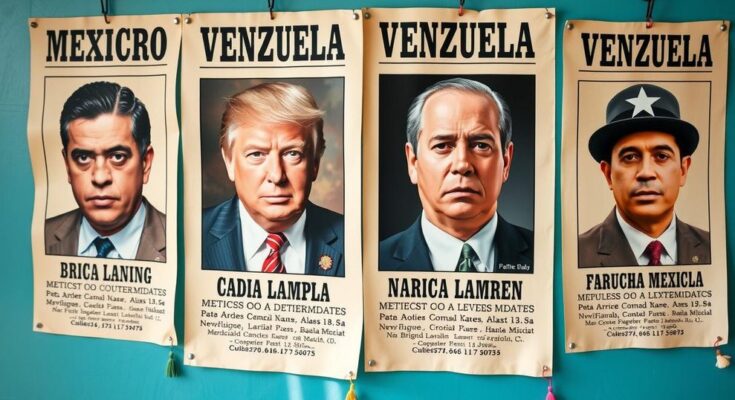Venezuela’s National Assembly has declared former Mexican presidents Vicente Fox and Felipe Calderón as unwelcome guests amid a political crisis surrounding disputed elections. The ruling party seeks to prosecute them as foreign conspirators and has released wanted posters in a show of force, reflecting deepening tensions between the government and international critics.
In a significant escalation of political tensions, Venezuela’s National Assembly has officially declared former Mexican presidents Vicente Fox and Felipe Calderón as personae non gratae. This decision follows the assembly’s broader condemnation of a group of former Latin American leaders who expressed support for Venezuelan opposition figure Edmundo González Urrutia in the case of disputed presidential elections. Despite the government’s assertion that Nicolás Maduro won these elections, González has claimed victory, sparking international recognition of his leadership from countries including the United States and members of the European Union.
Minister of the Interior Diosdado Cabello intensified hostilities by releasing wanted posters of Fox and Calderón, accusing them of conspiracy and undermining the peace in Venezuela. He instructed their distribution across the country, particularly at ports and airports, and threatened prosecution if they attempted to enter Venezuela. Fox, who served from 2000 to 2006, and Calderón, who governed from 2006 to 2012, have shown solidarity with González through social media endorsements. While the former leaders have not explicitly commented on the election results, Calderón indicated he would accompany González on a Latin American tour to garner support.
Additionally, the assembly’s ban extends to other former presidents including Mireya Moscoso, Mario Abdo, and Laura Chinchilla, among others, reflecting a strategy by the pro-Maduro lawmakers to assert a hardline stance against perceived foreign interference. This situation arises in the context of divergent international responses, with countries divided along pro-Maduro and pro-opposition lines, further complicating Venezuela’s political landscape. Recently, Mexico’s current leadership has stated a desire to respect the outcome of the Venezuelan elections as part of a democratic process despite the evident disputes surrounding it.
The political climate in Venezuela has increasingly polarized, primarily surrounding the legitimacy of elections and the recognition of leadership. Nicolás Maduro’s government faces substantial accusations of election fraud, particularly after declaring victory in the disputed 2024 elections that opposition leader Edmundo González Urrutia contests. The National Assembly’s declaration and the issuance of wanted posters signify a profound deterioration of diplomatic relations between Venezuela and several Latin American countries, particularly Mexico. In this context, international recognition of leadership claims and the call for electoral verification by key nations such as the United States and members of the EU emphasize the complexities of Venezuela’s political crises and regional dynamics.
In conclusion, Venezuela’s political strife has led to severe reactions against former Latin American presidents who have backed opposition claims. The Venezuelan government’s labeling of these leaders as unwelcome and the distribution of wanted posters highlights escalating tensions and a unwillingness to entertain external scrutiny. This situation not only underscores the contentious nature of Venezuelan politics but also illustrates the significant geopolitical divides influencing Latin America today, with some countries supporting Maduro and others identifying with the opposition.
Original Source: mexiconewsdaily.com




